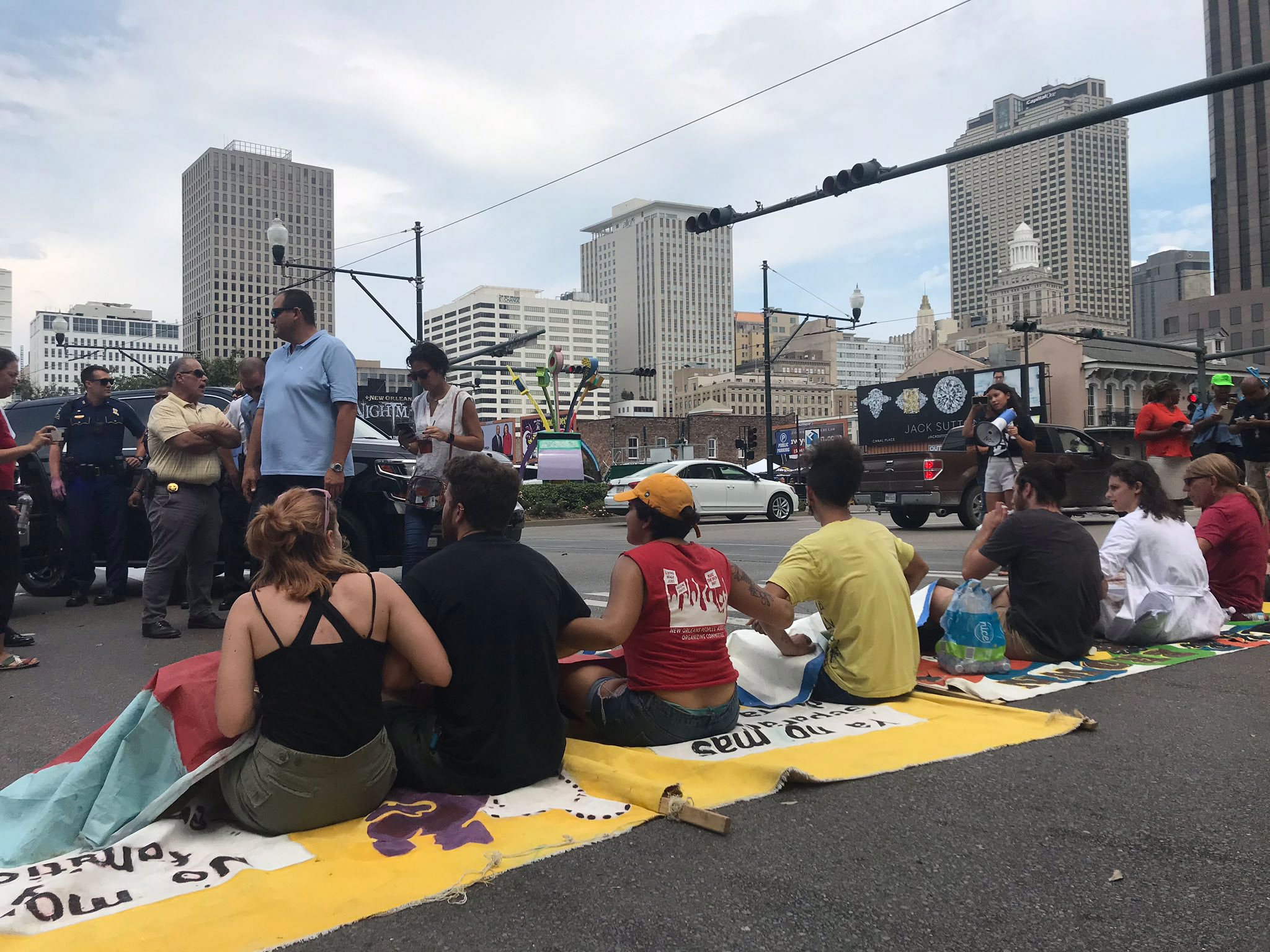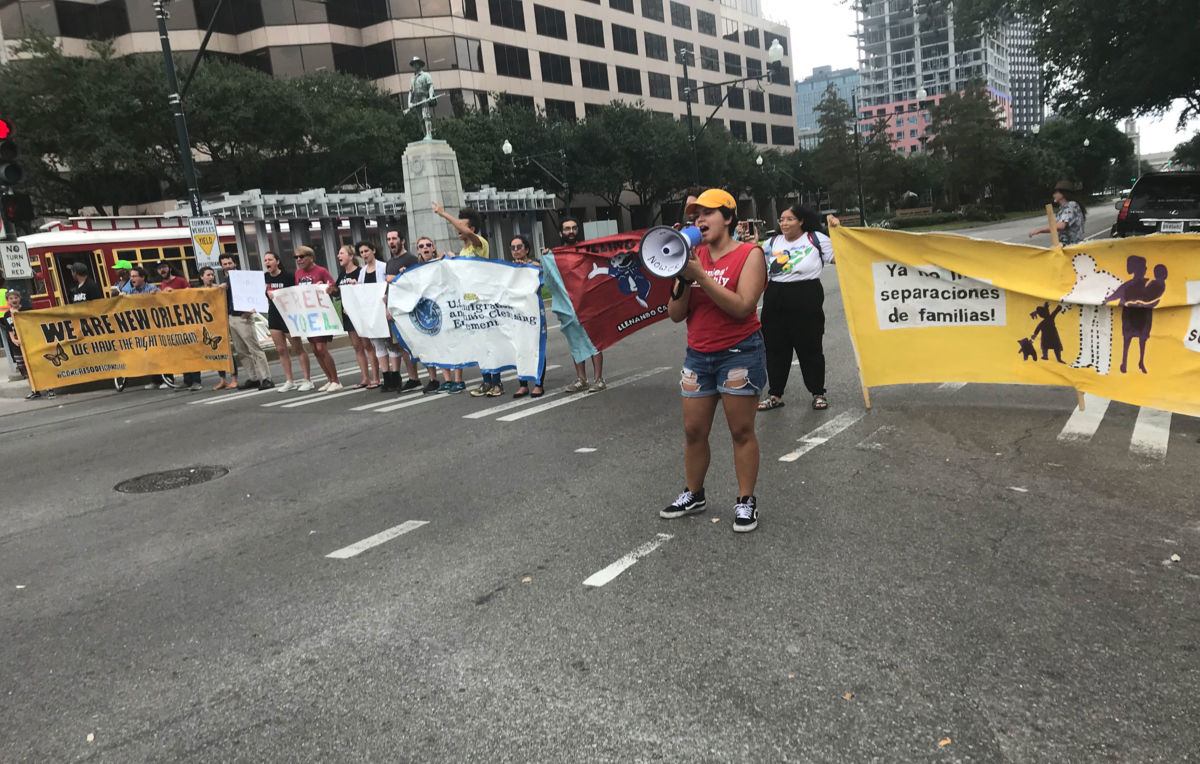Yoel Alonso Leal, a Cuban asylum seeker who has a lung tumor and has been struggling with gout and pneumonia while being shuffled through immigration jails, is facing deportation. Doctors and advocates say Leal’s health is quickly declining and he could die before his plane back to Cuba lands at the airport.
“There is a high chance that he would die from the flight itself. Deportation for him would be deadly,” said Kiersta Kurtz-Burke of Louisiana State University’s School of Medicine, during a rally outside the Immigration and Customs Enforcement (ICE) regional office in New Orleans on Monday.
Leal is one of several lead plaintiffs in a class-action lawsuit accusing the Trump administration of denying hundreds of asylum seekers a fair chance at being released from immigration jails in Louisiana, Mississippi and Alabama on parole. On September 5, a federal judge sided with the plaintiffs, issuing a preliminary injunction ordering ICE to follow its own policies and consider releasing jailed asylum seekers on a case-by-case basis as they wait for a judge to rule on their claims.
The next day, Leal learned that he could soon be deported, according to Julien Burns, a spokesman for the New Orleans Worker Center for Racial Justice, a group that organizes with immigrant communities. Burns said the timing of Leal’s deportation does not appear to be a coincidence: It’s likely that ICE does not want the plaintiff to die in its custody after denying him parole — but doesn’t want to release him in the U.S.
“He is evidence of the life-threatening consequences of denial of parole, so they are just trying to get him out of country,” Burns told Truthout in an interview.
Doctors who reviewed Leal’s medical records say there is a tumor in his lung based on “radiographic findings significantly concerning for lung cancer,” and Leal has struggled with severe gout and recurring bouts of pneumonia for months, according to a petition circulated by Physicians for Human Rights and other groups. Leal is currently unable to walk and dependent on other detainees to get around. ICE denies claims that immigrants held in its jails are unable to access necessary medical treatment.
At the rally outside the ICE office Monday, activists demanded to speak with William Joyce, ICE’s regional field director for the Southeast. When Joyce did not appear, several people blocked traffic in the New Orleans business district in protest, resulting in 10 arrests, according to Burns.
As Truthout has reported, large numbers of immigration defendants and asylum seekers are being indefinitely detained in a network of remote ICE detention centers and privately run jails and prisons in Louisiana and Mississippi. That network has rapidly expanded over the past year as the administration responds to influxes of migrants at the southern border with policies aimed at incarcerating as many as possible as they wait for a judge to rule on their asylum claims.

The number of asylum seekers released on parole has dropped dramatically under President Trump. Less than a decade ago, about 90 percent of detained asylum seekers were released on parole, according to the Southern Poverty Law Center (SPLC), which filed the class-action lawsuit. At the ICE field office in New Orleans, which oversees immigration prisoners in several Southeastern states, the number of asylum seekers released on parole dropped from nearly 76 percent in 2016 — the last year of the Obama administration — to 1.5 percent in 2018. So far this year, that number has dropped to 0 percent.
The lawsuit argues that a binding 2009 policy requires ICE to release asylum seekers from jail who can prove that they are not a flight risk and have “strong ties” to the community. Leal, a political dissident who fled Cuba in October 2018 after being detained and assaulted by police, passed his “credible fear” interview and began asylum proceedings after being apprehended at the Texas border. Leal’s wife is a legal U.S. resident living in Florida, and advocates argue Leal should have been released to his family for medical treatment and to pursue his asylum claims outside of jail.
Instead, Leal was incarcerated for nearly a year as his health declined in ICE custody after missing an initial deadline for filing parole paperwork in November 2018, according to the SPLC complaint. He never received a parole interview and later petitioned for parole with help of an attorney, but ICE denied the request in a letter declaring Leal a “flight risk” who failed to prove substantial ties to the community. A federal judge issued a deportation order in February.
“Cuban national Yoel Alonso Leal received due process before the federal immigration courts and was ordered removed from the U.S. to Cuba by a federal immigration judge February 27,” said Bryan Cox, an ICE spokesman, in a statement to Truthout. “The Board of Immigration Appeals subsequently dismissed an appeal of the order August 9. Mr. Leal is currently in ICE custody pending removal to his country of citizenship.”
Federal immigration judges work for the Department of Justice, not ICE. The number of deportation orders issued by federal judges has increased nationwide under Trump, and cases before courts in Louisiana and the Southeast result in removals and deportations at rates higher than much of the country. The Trump administration has sought to sideline the union representing immigration judges as it pushes policies aimed at speeding up deportation decisions.
Leal joins a growing list of jailed asylum seekers at the center of an ongoing controversy over alleged medical neglect in jails run by ICE and its private contractors. Last month, civil and disability rights groups filed a sweeping lawsuit against the Trump administration alleging immigration jails across the country provide dangerously inadequate medical care –– or deny it altogether –– and discriminate against immigrants with disabilities by refusing accommodations such as wheelchairs and sign language interpreters. At least 26 people have died after being held in immigration custody since Trump took office, including six children, according to migrant advocates.
“What has been done to Yoel is absolutely unconscionable,” Kiersta Kurtz-Burke said. “They found a tumor in his lung, and the only way he has a chance at survival is to release him to be cared for by his family. ICE has outright lied in his medical records.”
Cox said any claims that Leal or any other detainees have been denied “necessary medical treatment” are “patently false.”
Advocates for Leal filed an emergency request with ICE for a medical “deferred action” order that would put his deportation on hold while he receives medical treatment. Deferred action is a type of prosecutorial discretion that allows immigration authorities to defer a deportation order, in some cases so immigrants can continue receiving treatment for serious illnesses in the U.S. It’s similar to the deferred action program for undocumented immigrants who arrived in the United States as young children that was created by the Obama administration and became a political football under Trump.
Members of Congress, including Democrats Rep. Rashida Tlaib and Rep. Alexandria Ocasio-Cortez, have made online statements calling for Leal to be released in the U.S. for medical treatment.
Last month, the Trump administration announced that U.S. Citizenship and Immigration Services (USCIS) would no longer consider deferred action requests filed after August 7. About 1,000 requests for deferred action related to medical problems were filed with the agency last year, according to The New York Times. ICE is now responsible for considering deferred action requests. The change led to serious concerns about immigrants receiving treatment for serious illnesses in the U.S. who could face death if government refuses to defer their deportation orders.
Media that fights fascism
Truthout is funded almost entirely by readers — that’s why we can speak truth to power and cut against the mainstream narrative. But independent journalists at Truthout face mounting political repression under Trump.
We rely on your support to survive McCarthyist censorship. Please make a tax-deductible one-time or monthly donation.
